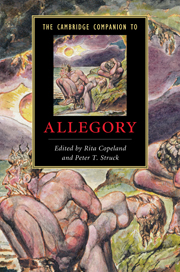Book contents
- Frontmatter
- Introduction
- Part I: Ancient foundations
- 1 Early Greek allegory
- 2 Hellenistic allegory and early imperial rhetoric
- 3 Origen as theorist of allegory: Alexandrian contexts
- Part II: Philosophy, theology, and poetry 200 to 1200
- Part III: Literary allegory: philosophy and figuration
- Part IV: The fall and rise of allegory
- Further reading
- Index
2 - Hellenistic allegory and early imperial rhetoric
from Part I: - Ancient foundations
Published online by Cambridge University Press: 28 January 2011
- Frontmatter
- Introduction
- Part I: Ancient foundations
- 1 Early Greek allegory
- 2 Hellenistic allegory and early imperial rhetoric
- 3 Origen as theorist of allegory: Alexandrian contexts
- Part II: Philosophy, theology, and poetry 200 to 1200
- Part III: Literary allegory: philosophy and figuration
- Part IV: The fall and rise of allegory
- Further reading
- Index
Summary
In their explicit doctrines, Plato and Aristotle express distrust and disdain for allegorical interpretation; but they do not manage to slam the door upon it altogether. Plato explicitly repudiates the allegories (hyponoiai) with which traditional tales of divine violence and immorality might be rescued for children (Republic 2.378D) and makes fun of attempts to make sense of myths by rationalizing them (Phaedrus 229C-30A). And yet the same Plato takes pains to introduce into crucial moments of various dialogues extended mythic narratives, often transparently allegorical in character, which seem designed to supply the philosophically correct forms of myth from which students will be able to learn acceptable views, once the incorrect forms transmitted to them by their traditional culture have been discarded. His independent-minded student Aristotle shares his teacher's anti-allegorical tastes: in his view of the development of human thought he disregards claims for the poets' philosophical seriousness and instead consigns their alleged cosmological views to the period before genuine philosophy began, while in his work on poetry he entirely ignores allegorical interpretations of epic, substituting for them the view that what makes Homer and other poets philosophically interesting are not any covert philosophical doctrines but the structures of human thought and action they explicitly portray.
- Type
- Chapter
- Information
- The Cambridge Companion to Allegory , pp. 26 - 38Publisher: Cambridge University PressPrint publication year: 2010
- 20
- Cited by



